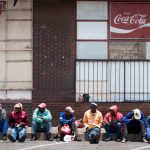How Eskom can benefit people and the environment
Electricity must be seen as a social entitlement rather than a commodity, and ‘Eishkom’ should be central to an ambitious and equitable project of progressive social transformation.
Author:
18 February 2019

In February 1921 Vladimir Lenin wrote that “Communism = Soviet power + electrification.” In South Africa in February 2019 the question of electricity has come to sit at the centre of how the failure of the ANC to govern in the interests of society is understood. We could, with a nod to Langston Hughes, propose a new formula: “A dream deferred = (parasitic) ANC power + Eskom, SAA, municipal budgets etc, etc.”
The failures of the ANC in government are as large, and as devastating for the impoverished majority, as they are legion. Education, health care, housing, employment and land reform are among the ruling party’s most acute failures, but there are many others. Whole towns, like Makhanda, formerly Grahamstown, are sinking into the morass that results from contempt for ordinary people, an abject lack of political imagination and relentless looting by the kind of politicians and officials well described by Frantz Fanon as “a sort of little greedy caste, avid and voracious, with the mind of a huckster”.
The middle class are often able to buy their way out of the state’s failures. Private schools, hospitals and security, gated communities, and all the rest, provide considerable insulation from a gathering social crisis. But although access to things like generators is also mediated by class there is a significant extent to which the ruination of Eskom also affects the middle class and is, therefore, understood as an urgent national crisis.
Related article:
The ANC was never willing to accept that, particularly in the context of systemic impoverishment, it is vital that electricity is understood as a social entitlement rather than a commodity. Huge subsidies for electricity costs have been granted to corporates, most notoriously BHP Billiton, while millions of people have either not been formally connected to the grid, or have been disconnected, sometimes violently, when they could not afford to pay for electricity.
Battles over access to electricity have been waged for years, with Eskom actively participating in attempts to criminalise self-organised access to the grid by people whom the state has not deemed worthy of connection, or by people who suffer from an absence of money rather than a “culture of non-payment”.
In 2013 seven people were injured, and two shot dead, by live ammunition fired at unarmed residents of the New Germany shack settlement in Reservoir Hills, in Durban, by security guards accompanying municipal officials on a raid aimed at disconnecting people from the grid. If something like this had happened under apartheid it would have made international headlines. In 2013 the scandal was that there was no scandal. It was just another day.
The harm done by Eskom extends beyond violent attempts to criminalise the survival strategies of impoverished black people. It has poisoned the air and water around its power stations. The coal mines that keep the fires in the power stations burning also have devastating environmental consequences. And Eskom is, in global terms, a significant contributor to the carbon crisis that is rapidly frying the planet. But Eskom is also a major employer in a country where mass unemployment, and impoverishment, are endemic.
Related article:
The debate on the way forward has become polarised and shrill to the point that it has taken on an increasingly hysterical tone. It has frequently collapsed into conspiracy theory. Things have got so bad that anyone expressing concern about privatisation, or the real possibility of massive job losses, is seen, in some circles, as a stooge for Zuma, the Guptas, or the broader networks of patronage that sustain the ANC.
As electricity prices rise, and reliability crashes, it’s difficult to remember that when the left in the Tripartite alliance still saw Jacob Zuma as a potential champion of their cause, despite the scurrilous conduct at his rape trial, the parastatals, including Eskom, were seen as key drivers of an imminent project of progressive social transformation.
As we all know, what actually happened is that parastatals like Eskom and SAA, along with the SABC and the government pension fund, were looted in the interests of predatory elites. It was as if Fanon’s scathing critique of the national bourgeoisie in The Wretched of the Earth had been read as a manual rather than a warning. Hopefully this bitter experience has been a salutary lesson to crude forms of nationalism and leftism that assume that nationalisation on its own is a magic key that automatically opens a path towards a more just society.
In the absence of democratic forms of transparency and oversight, respect for scientific evidence and a genuine commitment to a social project, no form of ownership can, on its own, guarantee a progressive outcome.
But the support for corporate-driven alternatives to state ownership, whether via the privatisation of Eskom in whole or in part, or bringing privately owned independent power producers into the process of generating power, is often also crudely ideological. We need to take serious cognisance that around the world private interests in the provision of basic services like water, transport and electricity have sought to commodify what should be basic and universal entitlements, with serious social consequences.
This is not simply a matter of putting profit before people. Collusion and corruption have also been widespread. The corrupt conduct of Enron was a key cause of the electricity crisis in California in 2000 and 2001. Closer to home we should not forget that KPMG and McKinsey have been as rotten as Eskom and SAA.
Related article:
In recent years more than a hundred cities around the world that had privatised electricity production and distribution have reversed privatisation and returned to various forms of public ownership.
In South Africa capital is particularly rapacious, significantly racialised, far from immune to corruption, often organised through monopolies, and frequently tied to powerful families. Blind faith in privatisation as a solution to the failures of the ANC to manage parastatals and other institutions in the public interest is irrational.
Eskom is R419 billion in debt and so far down the proverbial rabbit hole that there are no easy fixes. The massive patronage driven increase in managerial jobs, purging of expertise, and public subsidies for very expensive, privately owned independent power producers, are all compounding the utility’s problems.
The two giant new multi-billion-rand power stations, Medupi and Kusile, have been so badly designed and built that, even in terms of a logic purely concerned with costs in and kilowatts out, they are unlikely to succeed without massive further investment. It is important to recall that the ANC, via its “investment arm”, Chancellor House, profited, directly and shamelessly, from the fiasco into which the construction of these two power stations descended.
But some things are clear. We do need to move, as swiftly as possible, to green alternatives. As we undertake this shift there must, as the trade unions are demanding, be a just transition in which workers are not made to pay the price for the destruction wracked by a corrupt and avaricious elite. The logical alternative to the status quo is a shift to socially owned and managed renewable energy regulated to the highest standards of probity, subject to full transparency and explicitly organised around social goals.
Unions should be seen as key partners in this process. It is imperative that the desire for private enrichment, whether via the state or the market, must not trump the necessity to place the public interest, including environmental and labour concerns, as well as the immediate national urgency to secure affordable and reliable electricity, at the centre of a decisive, effective and just transition to a better way of doing things.



